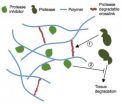(Press-News.org) WASHINGTON (March 31, 2014) — Giving patients steroids at the time of heart surgery does not improve health outcomes and appears to put them at greater risk of having a heart attack in the days following surgery, according to research presented at the American College of Cardiology's 63rd Annual Scientific Session. The finding, which stems from the largest randomized trial in cardiac surgery ever conducted, challenges a practice that many surgeons have used for decades.
"Based on these results, we suggest that steroids should not be used prophylactically during cardiac surgeries that require the use of cardiopulmonary bypass," said Richard Whitlock, M.D., associate professor of cardiac surgery at McMaster University, and lead investigator of the study.
Cardiopulmonary bypass, or the "heart-lung machine," is a technology that is instrumental in performing surgery for coronary heart disease and other heart conditions. More than half a million cardiac procedures are performed annually in the United States.
Steroids have been shown to reduce the body's inflammation reaction during and following the use of the heart-lung machine, though until recently no studies had evaluated whether using steroids actually improves patient outcomes. A survey conducted at the start of the trial suggests patients are currently given steroids in about 25 percent of medical centers worldwide. The use of steroids varies by country, hospital and surgeon.
"As cardiovascular disease continues to climb, cardiac surgery has become a common operation worldwide," Whitlock said. "Trying to improve the outcome for these patients is clearly imperative, and it is important to re-evaluate practices for which there is a lack of evidence and potential for harm. This study shows that administering steroids during cardiac surgery requiring bypass can cause harm."
The study involved more than 7,500 patients who underwent cardiac surgery with the use of the heart-lung machine in one of 82 participating medical centers across 18 countries spanning North America, South America, Europe, the Middle East and Asia. Half the patients were randomly assigned to receive methylprednisolone, a common steroid used to prevent inflammation, and half received a placebo. Health outcomes were assessed 30 days after surgery.
The study failed to meet both of its co-primary endpoints in that it did not show a significant benefit of steroid treatment over placebo in terms of either the overall rate of death or a composite metric that included death, heart attack, stroke, new renal failure or respiratory failure.
However, a pre-specified examination of the study's secondary endpoints, which included the rate of heart attacks, revealed that patients who received the methylprednisolone faced a 15 percent greater risk of death or heart attack and a 21 percent greater risk of heart attack alone, a pattern that was consistent across all subgroups. Of the study's 7,500 participants, 927 had a heart attack and 332 died.
The biological explanation for the increased rate of heart attack is not clear, Whitlock said, adding that the finding is specific to prophylactic steroids – those given solely as prophylaxis during cardiac surgery requiring the heart-lung machine, and not for any other medical reason. The results do not suggest steroids should be stopped in cardiac surgery patients who are already taking them for other reasons.
A 2012 study of 4,000 cardiac procedures in patients of a lower risk profile in the Netherlands also found steroids had no effect on death, heart attack, stroke, new renal failure or respiratory failure. That study, however, suggested a benefit of steroids in the sub-group of high-risk patients, a finding that was not reflected in the present study.
The hospitals that participated in the trial have launched two new studies to examine other aspects of cardiac surgery.
"This trial has helped us establish a large network of surgical centers to answer important questions about cardiac surgery in a very rigorous way," Whitlock said.
INFORMATION:
The Steroids in Cardiac Surgery trial (known as SIRS) was designed, coordinated and managed by the Population Health Research Institute at the Hamilton Health Sciences and McMaster University in Hamilton, Ontario, Canada. It was conducted from 2007-2014 with funding from the Canadian Institute for Health Research and the Canadian Network and Centre for Trials Internationally.
The ACC's Annual Scientific Session brings together cardiologists and cardiovascular specialists from around the world each year to share the newest discoveries in treatment and prevention. Follow @ACCMediaCenter and #ACC14 for the latest news from the meeting.
The American College of Cardiology is a nonprofit medical society comprised of 47,000 physicians, surgeons, nurses, physician assistants, pharmacists and practice managers. The College is dedicated to transforming cardiovascular care, improving heart health and advancing quality improvement, patient-centered care, payment innovation and professionalism. The ACC also leads the formulation of important cardiovascular health policy, standards and guidelines. It bestows credentials upon cardiovascular specialists, provides professional education, supports and disseminates cardiovascular research, and operates national registries to measure and promote quality care. For more information, visit CardioSource.org. END
Giving steroids during bypass surgery shows no benefit, some harm
Worldwide study of 7,500 patients challenges common practice in heart surgery
2014-03-31
ELSE PRESS RELEASES FROM THIS DATE:
Metformin fails to reduce heart failure after heart attack
2014-03-31
Washington (March 31, 2014) — The use of metformin, a common regulator of blood glucose for diabetics, does not help protect against heart failure in non-diabetic patients who have suffered a heart attack, according to research presented at the American College of Cardiology's 63rd Annual Scientific Session.
The GIPS-III trial is the first double-blind, randomized, placebo-controlled study conducted to evaluate whether four months of metformin treatment preserved left ventricular function in non-diabetic patients with acute myocardial infarction.
Metformin is commonly ...
Bariatric surgery beats medical therapy alone for managing diabetes
2014-03-31
WASHINGTON (March 31, 2014) — Gastric bypass and sleeve gastrectomy – two of the most commonly used bariatric surgeries – are more effective than intensive medical therapy alone when it comes to managing uncontrolled type 2 diabetes in overweight or obese patients after three years, according to research presented at the American College of Cardiology's 63rd Annual Scientific Session.
STAMPEDE is the largest randomized controlled trial with one of the longest follow-ups to compare the effect of these two procedures to intensive medical therapy in helping patients achieve ...
'Ivory tower' bucking social media
2014-03-31
EAST LANSING, Mich. — University scholars are largely resisting the use of social media to circulate their scientific findings and engage their tech-savvy students, a Michigan State University researcher argues in a new paper.
While social media is widely used in fields such as journalism and business – not just to push a product but also to engage in open dialogue with readers and clients – it has failed to take hold in academia's so-called ivory tower. This is troubling given that universities in the United States and Europe are trying to increase access to publicly ...
Can vitamin A turn back the clock on breast cancer?
2014-03-31
(PHILADELPHIA) – A derivative of vitamin A, known as retinoic acid, found abundantly in sweet potato and carrots, helps turn pre-cancer cells back to normal healthy breast cells, according to research published this month in the International Journal of Oncology. The research could help explain why some clinical studies have been unable to see a benefit of vitamin A on cancer: the vitamin doesn't appear to change the course of full-blown cancer, only pre-cancerous cells, and only works at a very narrow dose.
Because cells undergo many changes before they become fully ...
Excessive hospital occupancy levels result in avoidable mortality
2014-03-31
Once a hospital reaches a certain occupancy level, the quality of care it provides deteriorates, increasing the risk of mortality of critically ill patients. What is worrying is that this safety 'tipping point' is reached at occupancy levels that are below 100%. The findings are reported by a team of researchers led by Ludwig Kuntz, Professor of Health Management at the University of Cologne. Their paper (Stress on the Ward: Evidence of Safety Tipping Points in Hospitals) is to appear shortly in the international journal Management Science.
For the purposes of their study, ...
Anesthetic technique important to prevent damage to brain
2014-03-31
Researchers at the University of Adelaide have discovered that a commonly used anesthetic technique to reduce the blood pressure of patients undergoing surgery could increase the risk of starving the brain of oxygen.
Reducing blood pressure is important in a wide range of surgeries – such as sinus, shoulder, back and brain operations – and is especially useful for improving visibility for surgeons, by helping to remove excess blood from the site being operated on.
There are many different techniques used to lower patients' blood pressure for surgery – one of them is ...
Minneapolis Cardiology Fellow named an ACCF Young Investigators Awards finalist
2014-03-31
MINNEAPOLIS, MN – March 31, 2014 – Minneapolis Heart Institute Chief Cardiology Fellow Ankur Kalra, MD has been named as a finalist for the 2014 ACCF Young Investigators Awards. Kalra's research, funded by the Minneapolis Heart Institute Foundation (MHIF), supports the ongoing quest to better identify, with noninvasive tools, which heart attack survivors are at greatest risk for sudden cardiac death, and therefore may benefit from ICD (implantable cardioverter defibrillator) therapy. Kalra will present his research at the American College of Cardiology (ACC) meeting in ...
Can gratitude reduce costly impatience?
2014-03-31
The human mind tends to devalue future rewards compared to immediate ones – a phenomenon that often leads to favoring immediate gratification over long-term wellbeing. As a consequence, patience has long been recognized to be a virtue. And indeed, the inability to resist temptation underlies a host of problems ranging from credit card debt and inadequate savings to unhealthy eating and drug addiction.
The prevailing view for reducing costly impatience has emphasized the use of willpower. Emotions were to be tamped down in order to avoid irrational impulses for immediate ...
Periodic puns: Chemistry jokes just in time for April Fools' Day (video)
2014-03-31
WASHINGTON, March 31, 2014 — It's almost April Fools' Day, and the American Chemical Society's (ACS') Reactions video series is celebrating with an episode featuring our favorite chemistry jokes. Which two elements look cute together? Why is father water concerned about his "iced out" son? What do you get when you combine sulfur, tungsten and silver? Get all the punchlines in the latest Reactions episode, available at: http://youtu.be/C5RZRkhk0OM.
Subscribe to the series at Reactions YouTube, and follow us on Twitter @ACSreactions.
INFORMATION:
The American Chemical ...
New Penn-designed gel allows for targeted therapy after heart attack
2014-03-31
Combatting the tissue degrading enzymes that cause lasting damage following a heart attack is tricky. Each patient responds to a heart attack differently and damage can vary from one part of the heart muscle to another, but existing treatments can't be fine-tuned to deal with this variation.
University of Pennsylvania researchers have developed a way to address this problem via a material that can be applied directly to the damaged heart tissue. The potentially dangerous enzymes break down this gel-like material, releasing enzyme inhibitors contained within. This responsive, ...
LAST 30 PRESS RELEASES:
Novel camel antimicrobial peptides show promise against drug-resistant bacteria
Scientists discover why we know when to stop scratching an itch
A hidden reason inner ear cells die – and what it means for preventing hearing loss
Researchers discover how tuberculosis bacteria use a “stealth” mechanism to evade the immune system
New microscopy technique lets scientists see cells in unprecedented detail and color
Sometimes less is more: Scientists rethink how to pack medicine into tiny delivery capsules
Scientists build low-cost microscope to study living cells in zero gravity
The Biophysical Journal names Denis V. Titov the 2025 Paper of the Year-Early Career Investigator awardee
Scientists show how your body senses cold—and why menthol feels cool
Scientists deliver new molecule for getting DNA into cells
Study reveals insights about brain regions linked to OCD, informing potential treatments
Does ocean saltiness influence El Niño?
2026 Young Investigators: ONR celebrates new talent tackling warfighter challenges
Genetics help explain who gets the ‘telltale tingle’ from music, art and literature
Many Americans misunderstand medical aid in dying laws
Researchers publish landmark infectious disease study in ‘Science’
New NSF award supports innovative role-playing game approach to strengthening research security in academia
Kumar named to ACMA Emerging Leaders Program for 2026
AI language models could transform aquatic environmental risk assessment
New isotope tools reveal hidden pathways reshaping the global nitrogen cycle
Study reveals how antibiotic structure controls removal from water using biochar
Why chronic pain lasts longer in women: Immune cells offer clues
Toxic exposure creates epigenetic disease risk over 20 generations
More time spent on social media linked to steroid use intentions among boys and men
New study suggests a “kick it while it’s down” approach to cancer treatment could improve cure rates
Milken Institute, Ann Theodore Foundation launch new grant to support clinical trial for potential sarcoidosis treatment
New strategies boost effectiveness of CAR-NK therapy against cancer
Study: Adolescent cannabis use linked to doubling risk of psychotic and bipolar disorders
Invisible harms: drug-related deaths spike after hurricanes and tropical storms
Adolescent cannabis use and risk of psychotic, bipolar, depressive, and anxiety disorders
[Press-News.org] Giving steroids during bypass surgery shows no benefit, some harmWorldwide study of 7,500 patients challenges common practice in heart surgery


